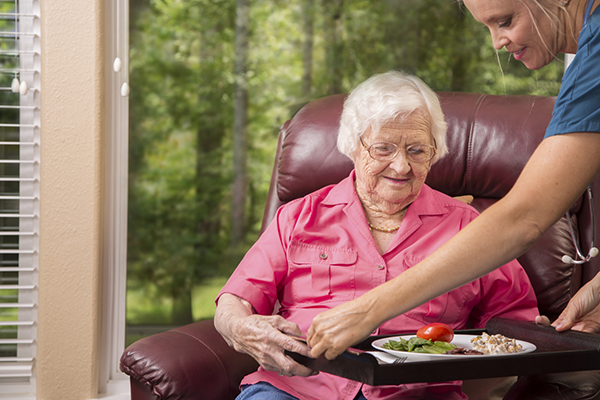Whole grains are an essential part of a healthy and balanced diet for everyone, especially for seniors and those over 50 years of age. The USDA’s My Plate program recommends half of your daily grain intake to come from whole grains, with a slight variance due to gender:
- Women 51 years and older should consume 5 servings of grains daily with at least 3 of them from whole grains.
- Men 51 years and older should consume 6 servings of grains daily with at least 3 of them from whole grains.
Want are the Benefits of Whole Grains?
When seniors are planning and preparing their meals, it is important to include whole, unrefined grains regularly, because they can help you:
- Get More Nutrients: Grains provide nutrients that are not included in refined flour. Whole grains have not had the bran and germ removed, which allows them to retain fiber, B vitamins, minerals, and unsaturated oils.
- Keep Your Heart Healthy: Grains may help reduce the risk of health disease. Without grains, your body is at an increased risk for poor heart health and irregular blood pressure.
- Make Digestion Easier: Grains contain fiber to help keep you regular with proper bowel function and reduced constipation.
- Curb Your Appetite: The fiber in whole grains can also help curb your appetite, keep you feeling full longer and result in overall fewer daily calorie intake, as well as reduce your risk of obesity and type 2 diabetes.
Why Don’t You Want Refined Grains?
Since grains are stripped of their bran and germ during milling and processing, the leftover refined grain is easier to chew and digest. This process also creates that nice flour we use to make light, fluffy breads and pastries. The reason nutritionists urge the limiting of refined grains is because they are missing the important nutrients our bodies require. According to the Harvard School of Public Health, grain processing eliminates more than half of wheat’s B vitamins, 90% of the vitamin E and nearly all of the fiber.
How Can I Eat More Whole Grains?
Including more grains in your diet isn’t as easy as it may seem. Be sure to include as many whole grains as possible. Eating a half loaf of white bread isn’t going to cut it. Here are some suggestions from the My Plate program and the American Cancer Society:
- Look for bread and pasta products labeled “whole grain” that include ingredients made from whole-wheat or whole-grain flour. Fun food ideas:
- Make whole wheat macaroni and cheese.
o Use whole-grain bread, whole-grain cracker crumbs or quick cooking oats in meatloaf. - Use cornmeal when making cornbread.
- Make whole wheat macaroni and cheese.
- Try brown rice instead of white. Fun food idea:
- Make brown rice stuffing in baked green peppers or tomatoes.
- Try whole oats instead of instant oatmeal. Fun food ideas:
- Try rolled oats or a crushed, unsweetened whole grain cereal as breading for baked chicken, fish, veal cutlets or eggplant parmesan.
- Add whole-grain flour or oatmeal when making cookies, muffins or other baked treats.
- Use whole grains in mixed dishes. Fun food ideas:
- Include barley in vegetable soup or stews and bulgur wheat in casseroles or stir-fries.
- Create a whole grain pilaf with a mixture of barley, wild rice, brown rice, broth and spices. For a special touch, stir in toasted nuts or chopped dried fruit.
- Eat whole grain snacks. Fun food ideas:
- Popcorn, which is a whole grain, can be a healthy snack if made with little or no added salt and butter.
- Snack on ready-to-eat whole grain cereals such as toasted oat cereal.
Keep Your Body Happy with Fiber-Filled Whole Grains
By taking in more whole grains, your body will have the nutrients needed to help reduce the risks of serious chronic health conditions. If you want more information, additional tips are available from the government’s My Plate program.
Contact Us
Need Help?
Compassionate Care Home Health’s certified nursing assistants and aides can prepare meals and snacks suited for specific diets and nutrition requirements. By asking for our homemaking services, we can ensure you or your loved one does not need to worry about meal preparation and other items such as day-to-day tasks and cleaning. Contact us online or call us at 877.308.1212 to learn more about how our home care services can help encourage healthy senior eating habits and offer support for a variety of other care needs. For a full list of all of the communities where we provide care, please visit our Locations page.

